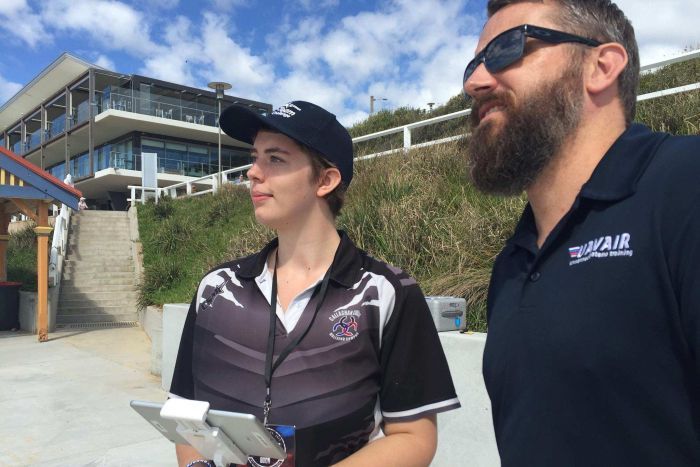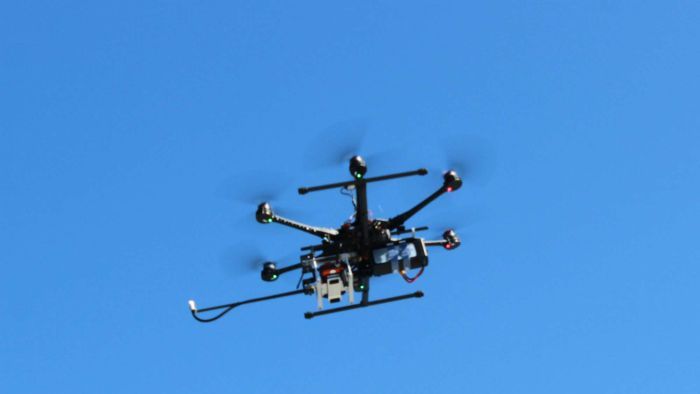Drone flying on curriculum at Newcastle school as students practice during Surfest
Posted
While some of the world's best surfers have been carving up the salty waves at Merewether Beach's Surfest this week, the incessant buzz of drones has been hovering overhead.
The flying devices are increasingly becoming a part of modern sports coverage and cinematography and these drones were being flown by students studying what is believed to be Australia's first school drone training program.
Callaghan College, in the New South Wales city of Newcastle, is offering year 11 and 12 students classes towards a Certificate III in Aviation as part of their Higher School Certificate.
A total of 24 students are involved and as part of Surfest, they are working with company UAVAIR to learn how to fly drones effectively and safely.
Students wanting careers using drones
Relieving principal at Callaghan College's Jesmond campus, Ian Ross, said they were the first school in Australia to teach drone technology to its students.
"We're really proud of that. The students are doing a Certificate III, which is CASA-approved," he said.
"At the end of it, when they qualify, they end up with a licence to be able to fly drones in certain conditions."
Mr Ross said the students planned to use their new drone flying skills in their future careers.
"We've talked to them about what their aspirations are as far as post-school and a lot of those students can articulate very, very well about where they can use this drone technology," he said.
"For example, some students are looking at going into the surveying field, some are going into aerial photography.
"We've got some students who are interested in possibly joining the RAAF and want to get some basic understanding of flight.
"Every day, a new application comes up for these drones, and it's very, very exciting."
Popularity creates space in business marketplace
 Photo:
Callaghan College in Newcastle is teaching over 20 students about aviation as part of their HSC. (1233 ABC Newcastle: Karen Shrosbery)
Photo:
Callaghan College in Newcastle is teaching over 20 students about aviation as part of their HSC. (1233 ABC Newcastle: Karen Shrosbery)
Ashley Cox, general manager of UAVAIR, said his business had grown dramatically because of the wider interest in drone technology.
Eighteen months ago, he started with two employees but to cater for the growing demand, that has now grown to 16 employees.
"We're seeing drones go into almost every industry and having a practical application to save money, increase the safety profile, or produce a better-quality outcome," Mr Cox said.
"I think for students that can grab this technology and adapt to it as it changes, and also look for opportunities, there's enormous potential for them.
"For students going through this, it just gives them so many options to go into different areas.
"We need good drone pilots, and young people adapt to the technology very quickly, so we're certainly hopeful that we'll be able to employ some of them in the future."
Drone flying not as expected
Callaghan College student Isis Lever has been practicing her drone skills at Surfest.
"The best way to look at surfing is probably directly above it, as close as you can get," she said.
"With drones, we have this unique perspective because you can't get above a surfer and film unless you have a helicopter.
"There's nothing quite like using a drone for surfing."
Ms Lever said that when she started learning, the experience what not what she expected it to be.
"I think I went into it with the expectation that it would feel like it [does] to control something in a simulation, which wasn't really the case," she said.
"There's something that feels very exciting about seeing it right in front of you as you fly it.
"As soon as I had my first flight, I knew that it was going to be a lot harder than I thought it was going to be, that I was going to really enjoy it, and that I wanted to do something like this in the future.
"It got me very excited about the potential of what I could do using the skills that I learned."
However, the possibility of a drone malfunctioning, injuring people and damaging property is a real one and the students are taught to make safety a priority.
"A lot of people don't understand quite how much work goes into making sure that your flight is safe and allowed," Ms Lever said.
"If you do fly it, it is a massive responsibility, because you are not just responsible for your own property damage, but also the people and the property around you.
"Without having gone through the course, I didn't really understand the responsibility that I had."
Topics: photography, film-movies, surfing, education, subjects, community-and-society, youth, merewether-2291, jesmond-2299








